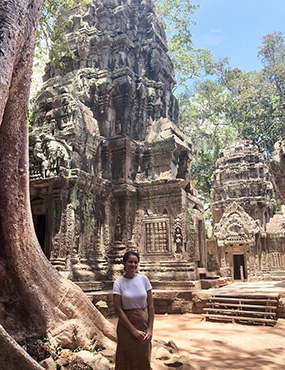Creating informed communities at the grassroots in Cambodia
NGO Forum has been instrumental in actively engaging in policy dialogues, debates and advocacy for the poor and vulnerable by hosting round tables with different NGOs across Cambodia.
NGO Forum seeks to ensure that well-informed citizens and civil society organisations in Cambodia positively influence pro-poor, equitable and sustainable development, supported by a transparent and accountable government.
NGO Forum’s overall goal is to ensure that citizens and civil society organisations are well-equipped to contribute and influence policymaking and implementation processes for the benefit of poor and vulnerable people of Cambodia. They regularly analyse proposed legislation, providing important feedback and commentary to government and the wider legal sector.
PACE activities
Law
Students focused on researching indigenous land rights and comparing the main modes of land ownership and land use for indigenous communities. The completed research was used for a review of the 2001 Land Law policy that was submitted to the government ministry.
Students provided legal support to NGO Forum's three core programming areas (Land and Forestry, Environment and Agriculture and National Policy). Students reviewed and made recommendations for policy processes to ensure land security and housing rights for displaced communities contributed to securing land tenure for indigenous people and strengthened forestry governance further improving policy processes.
Student experience - Seini Hafoka
 Q: What do you study and where did you go on your PACE International activity?
Q: What do you study and where did you go on your PACE International activity?
A: I am an undergraduate student studying Law and Social Science with a major in Criminology. I undertook my PACE International activity in Phnom Penh, Cambodia and worked with the NGO Forum on Cambodia.
Q: What was your role or project at your host organisation?
A: I worked with the NGO Forum’s Environmental and Agricultural Program. I specifically worked on the Climate Change Policy and Monitoring Project. It promotes awareness of climate change impacts in Cambodia by engaging local and international NGOs, government agencies, researchers, environmentalists’, educators and students. I was really excited to work with an organisation that brings multiple perspectives together to build resolutions that suit everyone.
Q: What attracted you to the PACE International program?
A: The opportunity to experience a new country and its culture whilst earning credit points towards a unit was too attractive to pass. I felt safe knowing that PACE International has been running for years and was impressed by the various partner organisations. Essentially, I was searching for a PACE program that could transform my way of thinking. I knew that being in a foreign country and working with their people would spark new interests in me. I was also excited to work with other students from the University who shared similar interests as me.
Q: What advice would you give a student who is thinking of applying for a PACE International activity?
A: Jump right in. If you’re certain that you’re eligible for the available units and meet all the prerequisites – take advantage of it! I only considered PACE International in my final year, and I wish I had taken advantage of it earlier. There are endless opportunities for students to experience different workplaces, cultures and people. It is a unique feature of Macquarie because not many other Universities give you the opportunity to work overseas whilst earning credits towards your degree.
As long as you do your research on the country and activity you’re interested in, there’s nothing to fear. Don’t be afraid to step out of your comfort zone. Cambodia was a country that I never thought of visiting before undertaking PACE. I’m glad that I took the chance because I experienced so many things that I never thought I would.
Q: What was the best part of your PACE International experience?
A: The best part of my experience was meeting so many different people. When you’re born and raised within a certain cultural context, you tend to forget how the other side of the world is living. I was fortunate enough to be raised in a working-class family, so there is a lot that I take for granted. The ability to attend University, earn a decent wage and move freely – it’s something you don’t consciously think about.